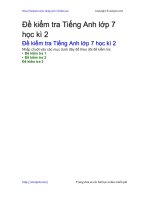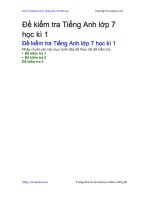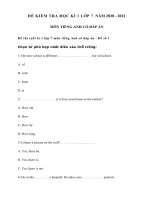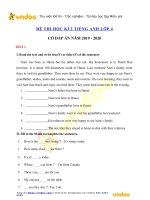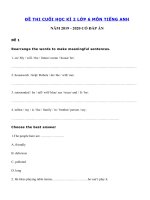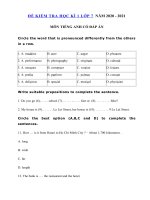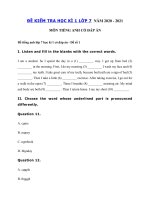BỘ đề KIỂM TRA TIẾNG ANH lớp 7 học kì 2
Bạn đang xem bản rút gọn của tài liệu. Xem và tải ngay bản đầy đủ của tài liệu tại đây (1.98 MB, 116 trang )
TESTS FOR
ENGLISH
7
TẬ P 2
2022
UNIT 7
I. “IT” INDICATING DISTANCE (Hỏi và trả lời về khoảng cách)
How far is it from A to B? It is about + khoảng cách
II. USED TO
Chúng ta sử dụng “used to”để diễn tả hành động, thói quen lặp đi lặp lại nhiều lần trong quá
khứ và bây giờ khơng cịn nữa.
(+) S + used to + V_inf
(-) S + didn’t use to + V_inf
(?) Did + S + use to + V_inf?
EXERCISES
I. “IT” INDICATING DISTANCE
Exercise 1: Circle the correct word.
1. How far is it from your apartment (from/ to) the city centre?
2. It is (at/ about) 1 kilometer.
3. It is not very (near/ far) from my house to the office. It is just 500 meters.
4. How far (is it/ it is) from your country to Japan?
5. How (far/ much) is it from your location to the train station?
6. My house is 2 kilometers (near/ far) from my grandparent’s bungalow.
7. How far (is it/ are they) from here to the local museum?
8. I think it is about 200 (meters/ meter) from here to the nearest bus stop.
9. My school is not far (from/ to) my house. I can walk to school every day.
10. How far is it (from/ at) your office to the supermarket?
Exercise 2: Write questions for these answer.
1. ________________________________________________________________?
It’s about 300 meters from here to the nearest post office.
2. ________________________________________________________________?
It’s about 3,900 kilometers from New York to California.
3. ________________________________________________________________?
It is about 200 meters from my house to my family store.
4. ________________________________________________________________?
It’s about 4576,89 miles from Beijing to Berlin.
1
5. ________________________________________________________________?
It’s about 1 kilometer from my hotel to the beach.
6. ________________________________________________________________?
It’s about 500 meters from here to the place where I live.
7. ________________________________________________________________?
It is 200 kilometers from his hometown to the place where he lives now.
8. ________________________________________________________________?
It is just 200 meters from the park to the parking lot.
9. ________________________________________________________________?
It’s approximately 4 kilometers from here to the airport.
10. ________________________________________________________________?
It’s about 60 kilometers from my parent’s house to mine.
Exercise 3: Write answers for the questions.
1. How far is it from your house to the gym? (300 meters)
- _______________________________________________________________________
2. How far is it from your house to your workplace? (2 kilometers)
- _______________________________________________________________________
3. How far is it from Hanoi to Hoi An? (about 800 kilometers)
- _______________________________________________________________________
4. How far is it from Earth to Mars? (about 34 million miles)
- _______________________________________________________________________
5. How far is it from Earth to the nearest star? (4.2 light-years)
- _______________________________________________________________________
II. USED TO
Exercise 1: Circle the correct answer.
1. I (used to/use to) collect stamps when I was nine years old.
2. My father (used to/ use to) be an excellent student at university.
3. I didn’t (used to/ use to) eat with chopsticks when I lived in America.
4. Did they (used to/ use to) work in a big factory before their retirement?
5. Peter (used to/ use to) drive to work but now he doesn’t.
6. My younger brother didn’t use (walk/ to walk) to school.
7. My classmate didn’t (used to/ use to) like me.
2
8. There (used to/ use to) be a lot of trees along this street.
9. Horse and cart used to (be/ is) the main way of transportation.
10. Coffee didn’t (used to/ use to) be my favourite drink.
11. Did Sarah (used to/ use to) be Mr. Vu’s student?
12. My grandmother (used to travel/use to travel) a lot before she got married.
13. Mr. Ha (used to/ use to) work in Japan for 3 years.
14. I didn’t (like used to/use to like) reading books.
15. Did Jim and Jane (used to/ use to) hate each other?
Exercise 2: Complete the sentences with form of “used to”.
1. My father (smoke) _______________ a lot but he gave up three years ago.
2. My brother (do) _______________ thewashing but now he wants to help my mom do it.
3. Jane (break) _______________ the speed limit and a police officer stopped her.
4. The Smiths (live) _____________ in the country but now they live and work in the city.
5. The doctor (be) _______________ famous but now everyone knows him.
6. My hometown (have) _________________ an amusement park but the authorities have
opened one.
7. My student (be) _______________very bad at Math but now he improves a lot.
8. Jim’s brother (like) _______________ reading comic but he stopped reading it one year
ago.
9. His parents (live) _______________ in a small house but now they live in a big one.
10. I (go) _______________ to work by bus but now I drive my car to work.
11. Joe and I (like)_____ __________ each other but now we are best friends.
12. Sue (fancy) _______________ rock music but now she is a fan of it.
13. My uncle (work) _______________ as a police officer before he retired.
14. ___________________ (you/ catch) fireflies when you were a child?
15. I (play) _______________ tennis with my friends but now I’m too busy to continue.
Exercise 3: Rewrite the sentences without changing the meaning, using “used to V”.
1. My husband didn’t do housework but now he does.
- _______________________________________________________________________
2. Children didn’t play with high-tech devices at early age but now they do.
- _______________________________________________________________________
3. The students didn’t go to school by public transportation but now they do.
3
- _______________________________________________________________________
4. My city was a tourist destination but now it isn’t.
- _______________________________________________________________________
5. Traffic jam didn’t happen when I was small but it happens now.
- _______________________________________________________________________
6. My mother worked at a restaurant 3 years ago but now she doesn’t.
- _______________________________________________________________________
7. He was the President of Student Union but now he isn’t.
- _______________________________________________________________________
8. There were many tree-lined streets in my hometown but now there is none of them.
- _______________________________________________________________________
UNIT 8
I. -ED AND –ING ADJECTIVES. (TÍNH TỪ V_ING VÀ V_ED)
Cách thành lập tính từ V_ed.
Thêm-ed vào sau động từ để tạo ra tính từ miêu tả ai đó cảm thấy như thế nào, cảm xúc của
một người.
Eg: I’m interested in science-fiction films.
Cách thành lập tính từ V_ing.
Thêm -ing vào sau động từ để tạo ra tính từ miêu tả ai, cái gì mang lại cảm giác như thế nào
cho đối tượng khác.
Eg: Last night, I saw an interesting science-fiction film.
EXERCISES
Exercise 1: Choose the correct adjective to complete these sentences.
1. interested/ interesting
- Jim’s _____________________ in reading book.
- Jim finds reading books _____________________.
2. fascinated/ fascinating
- Jane sometimes has many _____________________ ideas.
- We’re _____________________ by Jane’s ideas.
3. depressed/ depressing
4
- The weather was _____________________ yesterday.
- The weather made me fell _____________________ yesterday.
4. annoyed/ annoying
- His tone of voice is _____________________.
- I’m so _____________________ by his tone of voice.
5. shocked/ shocking
- His latest news was _____________________.
- We were _____________________ at his latest news.
6. moved/moving
- The film was so _____________________.
- I was deeply _____________________ by the film.
7. terrified/ terrifying
-Both of us were _____________________ of that violent scene.
-That violent scene was _____________________.
8. tired/ tiring.
- Going shopping all day makes me feel _____________________.
- Going shopping all day is _____________________.
Exercise 2: Choose the correct adjective in each sentences.
1. She’s ________ of her job. She’s looking for another.
A. bored
B. boring
2. This wet weather is so ________.
A. depressed
B. depressing
3. I didn’t find his joke very ________.
A. amused
B. amusing
4. I am ________ of snakes.
A. frightened
B. frightening
5. I am ________ about my test grades. They are all bad.
A. depressed
B. depressing
6. There’s nothing more ________ than riding on a rollercoaster.
A. excited
B. exciting
7. I was ________ to hear he’s 50. He looks much younger.
A. surprised
B. surprising
5
8. The book I’m reading is ________.
A. interested
B. interesting
9. You look ________. What’s wrong?
A. worried
B. worrying
10. We had a ________ time at the restaurant. The place is awful.
A. shocked
B. shocking
Exercise 3: Fill in the gap with the suitable form of adjective from the word given.
1. Jim had an accident yesterday and his situation is _______________. (worry)
2. The result of her exam is very _______________. (encourage)
3. This is the most _______________ film I have known. (thrill)
4. Everyone was _______________ at her new hair. (surprise)
5. Jane gave up her part-time job because it was too _______________. (exhaust)
6. The rainforests are disappearing at an _______________ rate. (alarm)
7. They are never _______________. They are always complaining. (satisfy)
8. My teacher was very _______________ that I studied hard. (please)
9. I’m very _______________by your behavior. (disappoint)
10. We were _______________ by the ghost film that we couldn’t sleep at night. (terrify)
II. ALTHOUGH/ IN SPITE OF/DESPITE, HOWEVER/ NEVERTHELESS
1. Although, despite/ in spite of (Mặc dù)
a. Cấu trúc:
Câu khẳng định
Although + Clause, Clause.
Despite/ In spite of+N/ N phrase, Clause.
Although + Clause (phủ định), Clause:
Although + Clause, Clause (phủ định)
Câu phủ định
Despite/ In spite of+ N, Clause (phủ định)
Despite/ In spite of+N phrase, Clause (phủ định)
Despite/ In spite of+not + N phrase, Clause.
b. Cách dùng:
Chúng ta sử dụng “although, despite/ in spite of” để diễn tả sự đối lập của hai sự việc, hiện
tượng trong cùng một câu.
Eg:
We enjoyed our camping holiday although it rained everyday.
We enjoyed our camping holiday despite the rain.
6
2. However, nevertheless (Tuy nhiên)
a. Cấu trúc:
• Clause 1. However/ nevertheless, Clause 2.
• Clause 1. However, Clause 2.
b. Cách dùng:
Dùng để diễn tả hai câu có nội dung đối lập nhau.
Eg:
I am good at English. However, I study Math so badly.
EXERCISES
Exercise 1: Complete the sentences below with “although, despite, in spite of, however
or nevertheless”. Sometimes, two answers are possible.
1. ________________ it was raining heavily; he went out without a raincoat
2. ________________ I heard the telephone ring, I didn’t answer it.
3. I like the outdoors. ________________, I don’t like bugs and dirt.
4. ________________ her fear, she wrapped her arms around him.
5. The sky was grey and cloudy._____ ___________, we went to the beach.
6. Last night I didn’t go to bed early ________________ being very tired.
7. My father tried to lift the box. ________________, it was too heavy.
8. We won the game ________________ having lost two players.
9. I called Jane 4 times. ________________, she didn’t answer me.
10. ________________ Peter was not invited to the party; he was the first to come.
Exercise 2: Choose the best answer.
1. We adore winter _________ the cold.
A. in spite of
B. although
C. however
2. She went to bed early _________ she didn’t finish her work.
A. despite
B. although
C. however
3. _________ the fact that he is 23 years old, he is so childish.
A. In spite
B. Despite
C. However
4. I go to school by bus every day. I don’t like it much, _________.
A. despite
B. although
C. nevertheless
5. _________ Jim owns two cars; he rarely drives to work.
A. Despite
B. Although
C. However
6. The athlete completed the race_________ his pain.
7
A. despite
B. although
C. nevertheless
7. Jane looks pretty. She, _________ seem to lack personality.
A. despite
B. although
C. nevertheless
8. _________ we have a small chance to win, we won’t lose hope.
A. Despite
B. Although
C. However
9. _________ of his bad luck, he won the medal.
A. In spite
B. Despite
C. Nevertheless
10. He is friendly _________ the fact that he’s very famous.
A. despite
B. although
C. however
Exercise3: Rewrite the following sentences, using the given cues. Keep the meaning
same.
1. Although I had a headache, I enjoy the amusing movie.
In spite of ______________________________________________________________
2. My brother still went to school yesterday although he was sick.
Despite ________________________________________________________________
3. In spite of the awful weather, we enjoyed our party last night.
Although ______________________________________________________________
4. Although Tom was a poor student, he studied very well.
In spite of _____________________________________________________________
5. Mary could not go to school because she was sick.
Because of ____________________________________________________________
UNIT 9
I. H/WH QUESTIONS
Trong tiếng Anh, khi chúng ta cần hỏi rõ ràng và cần có câu trả lời cụ thể thì dừng câu hỏi
với các từ để hỏi (question words).
Cấu trúc thông thường của loại câu hỏi Wh questions
1. Dạng Câu hỏi tân ngữ: Wh – word+ auxiliary + S + V + (object)?
Eg: Where do you live?
2. Dạng 2: Câu hỏi bổ ngữ: Wh – word+ to be + S + complement?
8
Eg: Where is Mary?
3. Dạng 3: Câu hỏi chủ ngữ: Wh - word + V + object?
Eg: Who teaches you English?
EXERCISES
Exercise 1: Choose the correct answer.
1. _______ helped you find your keys? – Myfriend.
A. When
B. Who
C. Which
D. Whose
2. _______ did you found your keys? – Afew minutes ago.
A. When
B. Why
C. What
D. How
3. _______ is the tallest person in your family?
A. When
B. Who
B. Which
D. Whose
4. _______ essay got the highest score? – ItsJim’s.
A. When
B. Who
B. Which
D. Whose
5. ______ is it from your house to the festival’s venue?
A. How far
B. How long
C. How often
D. How many
6. _______ people are there in your company?
A. How many
B. How long
C. How often
D. How much
7. _______ is this table made of? – It’s made of wood.
A. How
B. What
C. Whom
D. Which
C. How often
D. How much
8. _______ have you lived here?
A. How many
B. How long
9. _______ did you use to go to school? – Iused to walk to school.
A. How
B. What
C. Whom
D. Which
10. _______ does your father do? – He’s an architect.
A. How
B. What
C. Whom
D. Which
Exercise 2: Write questions so that you have the answers given.
Eg: How was the food at the party last night?
Oh, it was delicious.
1. _______________________________________________________________?
He’s friendly and generous.
2. _______________________________________________________________?
By car.
9
3. _______________________________________________________________?
It was found yesterday.
4. _______________________________________________________________?
By the police.
5. _______________________________________________________________?
Twice a month.
6. _______________________________________________________________?
It’s about 2 kilometers.
7. _______________________________________________________________?
Miss Hoa.
8. _______________________________________________________________?
It’s hers.
II. ADVERBIAL PHRASES
1. Cấu trúc:
• Cụm trạng từ có thể là danh từ, giới từ hoặc động từ nguyên mẫu.
• Cụm trạng từ có thể là một từ hoặc là một cụm từ có các thành phần bổ nghĩa.
After breakfast/ Before lunch
Usually/ Often/ Sometimes/ Rarely
Late/ Very early/ On time
Here/ There/ Over there
On the funniest way/ Much funnier than usual
2. Cách dùng chính:
Cụụm trạng từ được dùng để trả lời cho câu hỏi “How”, “When “, “Where”,“Why”.
EXERCISES
Exercise 1: Write the question words for the underlined adverbial phrases.
1. The teacher took us to the museumyesterday.
2. We went to the museum to learn and have fun together.
3. We visit the museum every year.
4. Last year, our family traveled to SaPa by coach.
5. There were many wonderful things in SaPa.
6. Tom wrote me a letter to apologize for what he said.
7. During summer, I spend most of my time reading.
10
8. I can find everything I need in the supermarket.
9. My father helped me by giving me useful advice.
10. I visit my grandparents in America every 2 years.
Exercise 2: Complete the sentences with one suitable adverbial phrase.
to visit my parents
for 4 months
for relaxation
last year
in Thailand
with flowers
every two weeks
in winter months
1. Sue has worked in this software company ________________.
2. My husband and I go fishing ________________.
3. I hope I have the chance to join in the Water festival ________________.
4. ________________, many people want to go ice – skating.
5. ________________, I travel to France to take part in the Cannes Film Festival.
6. This summer, I will come back to my hometown ________________.
7. I often decorate my living room ________________.
8. Once or twice a week, I go cycling to the outskirts of the city ________________.
UNIT 10
I. THE FUTURE CONTINUOUS: THÌ TƯƠNG LAI TIẾP DIỄN
(+)
S + will be + V_ing.
(-)
S + will not be + V_ing.
(?)
Will + S + be + V_ing?
Thì tương lai tiếp diễn diễn tả hành động sẽ đang diễn ra tại một thời điểm xác định trong
tương lai.
Eg: At this time next week, we will be studying Unit 11.
EXERCISES
Exercise 1: Complete the sentence with the correct form of the words in brackets.
1. I __________________ (study) at 8.00 tomorrow.
2. You __________________ (wait) for her when her plane arrives tonight?
3. Don’t phone me between 7 and 8. We __________________ (have) dinner then.
4. I will be very busy tomorrow, so I (not go) __________________ shopping with my
friends at 4 p.m.
11
5. My parents want to go fishing, so they (fish) ________________ at this time next
weekend.
6. I think it (snow) __________________ at this time tomorrow, so I decide to stay home
for warmth.
7. Today I don’t have any homework, so (not do) __________________ homework at 5
o’clock this afternoon.
8. I have classes tomorrow morning. I (learn) __________________ English at 9 a.m.
9. My bike is broken. I (not ride) __________________ it to school at this time tomorrow.
10. Jim’s bought a train ticket. He (travel) ____________ to Venice at this time next week.
11. We’ve canceled out boat trip. We (not sail) __________________ along the river at
this time next week.
12. My parents won’t be home next week. I (eat) __________________ alone at this time
next week.
13. I (help) __________________ my mom with housework at this time tomorrow because
she will come home late.
14. My wife wants to eat out tomorrow, so she (not cook) __________________ at this
time tomorrow.
15. My favorite singer (perform) __________________ at 7 p.m. tomorrow. I will spend
time for his show.
Exercise 2. Choose the correct answer.
1. I think Josh won’t (be lying/lie) me again.
2. I will (be lying/lie) on my bed an hour from now.
3. At midnight today, everyone won’t (be sleeping/ sleep) because they want tosee the
fireworks.
4. Will you (be coming/come) to my birthday party tomorrow, Ann?
5. I think it will (be raining/ rain) at this time next month.
6. I will (be talking/ talk) with my foreign friend at this time next week.
7. I don’t think that Jim will (be winning/ win) the competition tomorrow.
8. My sister will (be having/ have) dinner with her boyfriend at 7 p.m. tomorrow.
9. Jim will (be learning/ learn) Japanese because he likes it.
10. Mr. Smith will (be going/go) shopping with me tomorrow.
12
II. THE FUTURE SIMPLE PASSIVE: BỊ ĐỘNG ỞTHÌ TƯƠNG LAI ĐƠN
(+)
S + will be + V_PP + by O.
(-)
S+ will not be + V_PP + by O.
(?)
Will + S + be + V_PP + by O?
Eg:
We will use low energy light bulbs. → Low energy light bulbs will be used.
EXERCISES
Exercise1. Choose the correct answer.
1. The contract will be ________ by the CEO.
A. sign
B. signing
C. signed
2. The last decision will ________ by the leader.
A. make
B. be make
C. be made
3. The house ________ before my mother comes home.
A. will clean
B. will be cleaned
C. will be cleaning
4. This museum ________ by thousands of people.
A. will visited
B. will be visited
C. will be visit
5. My grandmother ________ after by my sister when I am not home.
A. will look
B. will be looked
C. will be looking
6. ________ painted blue?
A. Will the room
B. Will be the room
C. Will the room be
7. Will the problem ________ before 8 a.m. tomorrow?
A. solve
B. be solved
C. be solving
8. When ________ be built?
A. will
B. will the tower
C. the tower will
9. Your secret ________ revealed by anyone.
A. won’t
C. won’t being
B. will not be
10. The meeting ________ by many people.
A. will be not attended
B. will not be attended
C. won’t attended
Exercise 2. Fill each blank with a verb in the box. Use the future simple passive.
find
hold
install
use up
put
use
replace
exploit
build
broadcast
1. The government has passed laws to protect the forests, so forests (not) ______________
for woods any more.
13
2. If we don’t save natural resources, they _______________ in the near future.
3. I think that renewable sources of energy _______________ widely in the future.
4. Scientists believe that new sources of energy _______________ soon.
5. Some windmills _______________ in my hometown. We will probably use wind power
instead of hydroelectricity power.
6. It is possible that hydroelectricity ________________ by solar or wind energy in the
next decade.
7. A conference on alternative energy ________________ next month.
8. A TV program about new sources of energy _______________ live tomorrow morning.
9. Two thousands of solar panels ________________ in this area next year.
10. Watershed forests _______________ under protection of the government.
UNIT 11
I. ĐỘNG TỪ KHUYẾT THIẾU “WILL” CHỈ TƯƠNGLAI (WILL FOR FUTURE
PREDICTION)
Khẳng định S+will+ V_inf
Phủ định
S + will not (won’t)+ V_inf
Nghi vấn
Will+ S+ V_inf?
Dùng để dự đoán về một hành động hoặc một sự kiện sẽ xảy ra trong tương lai.
Eg:
We will build a new bridge here.
In the future, robots will drive cars.
He will come late tomorrow.
Chú ý: Will là một động từ khuyết thiếu nên:
Động từ theo sau nó ln ở dạng ngun thể khơng to.
Will khơng cần chia theo ngôi của chủ ngữ.
EXERCISES
Exercise 1. Put the verbs in brackets in the simple future tense.
1. In twenty years’ time, people _will spend_ (spend) their holidays on the moon.
2. Next year I ________________ (do) a French course.
3. I ________________ (not finish) my studies until June next year.
4. They ______________ (not depend) on their mothers for everything in about two years.
14
5. I think there ________________ (be) a lot of tourists coming to this area next year.
6. In the future, more and more people ________________ (turn) to the sun for energy.
7. In 50 years’ time, people ________________ (travel) by helicopter to work.
8. I don’t think I ________________ (get) the scholarship.
9. He knows for sure that he ________________ (win) in the next competition.
10. In the future, buildings ________________ (be) taller and more modern.
11. I think that people ________________ (drive) flying vehicles to work in the future.
12. People ________________ (not use) ox or horse cart any more.
13. Jane expects that her mother ________________ (come) home early today.
14. Future vehicles ________________ (run) on biofuel and other green energy.
15. My grandfather doesn’t believe that cars _____________ (fly) like planes in the future.
Exercise 2. Choose the correct word or phrase in each sentence.
1. I think that Jim (will/ won’t) go to school tomorrow because he’s sick.
2. Flying cars will (see/be seen) everywhere in the future.
3. Jim (will/ won’t) come to our party because he has a tight schedule.
4. Some scientists (think/ will think) that the Earth (explodes/ will explode) in the future.
5. I don’t think that we will (make/be made) contact with the aliens in the future.
6. Jane thinks there (will/ won’t) be traffic jam in the airways if every person owns a flying
car in the future.
7. Inland waterways of the city will (upgrade/ be upgraded) soon.
8. It (is/will be) predicted that we (will run/is run) out of fossil fuel in the future.
9. There (is/ will be) an overpass in my city now and I think they (will build/ are built)
another next year.
10. I hope that the problem of traffic jam will (solve/be solved) as soon as possible.
II. ĐẠI TỪ SỞ HỮU (POSSESSIVE PRONOUNS)
Đại từ sở hữu là từ chỉ sự sở hữu của người hoặc vật với người hoặc một sự vật khác. Đại từ
sở hữu được sử dụng để thay thế cho tính từ sở hữu theo sau để tránh lặp lại. (Đại từ sở hữu
= Tính từ sở hữu + Danh từ).
Eg:
This is my pen and that isyours. (yours = your pen)
Her shirt is new, and mine is old. (mine = my shirt) / Tim is a friend of mine.
15
Bảng liệt kê đại từ nhân xưng chủ ngữ, tính từ sở hữu và đại từ sở hữu
Đại từ nhân xưng chủ ngữ
Tính từ sở hữu
Đại từ sở hữu
Nghĩa
I
my
mine
của tơi
you
your
yours
của bạn/các bạn
we
our
ours
của chúng tơi
they
their
theirs
của họ
he
his
his
của anh ấy
she
her
hers
của cơ ấy
it
its
its
của nó
EXERCISES
Exercise 1. Choose whether each sentence requires a possessive adjective or a
possessive pronoun.
1. She’s not his friend, she’s (my/mine).
2. Robert didn’t drive his own car. He drove (her/ hers).
3. That is one of (hers/ her) best friends.
4. Hid neighbourhood is safe, while (my/ mine) neighbourhood isn’t.
5. Did (your/ yours) mother call you yesterday evening?
6. I don’t know (them/their) very well.
7. I don’t know (them/their) daughter very well.
8. I talked to (my/ me) grandmother for three hours last night.
9. She will never tell (him/his) about that.
10. I think I got my notes mixed up with (your/ yours).
Exercise 2. Complete the following sentences using possessive adjectives or pronouns.
1. Why did you lend Minh your jacket?
- Because she forgot _____________ and it was cold.
2. I like _____________ bike.
- Oh, it’s not _____________. My sister lent it to me.
3. Are these their bags?
-No, they aren’t _____________. They’re _____________. They belong to us.
4. Mr. Hoang must be very rich. _____________ house is like a palace.
-Yes, it’s beautiful.
16
5. I wish I could have a computer of my own.
- I can give _____________ to you as a gift.
6. He has a fierce dog.
- Yes, you must watch out on _____________ dog. It can attack you any time.
7. You’re using my eraser without asking!
- No, it’s _____________, not _____________.
8. Have you seen _____________ glasses somewhere?
- They’re on _____________ head!
9. This shirt looks nice on you.
- Thanks. I really like _____________ colour.
10. That house has a beautiful fence around _________ garden.
- Yes, I love the fence, especially _____________ pattern.
Exercise 3. Choose the correct answer.
1. Have you got _________ pen, or would you like to borrow _________?
A. your – mine
B. yours – my
C. yours – mine
2. Jane’s voice is good. _________ is good, too.
A. I
B. my
C. mine
3. _________ cat is adorable. _________ is adorable too.
A. Your – My
B. Your – Mine
4. My face looks like _________ face.
C. Yours – Mine
A. she
B. her
C. hers
5. It’s not _________ fault. It’s_________.
A. your – mine
B. yours – mine
C. your – my
6. Jim’s car was parked here. _________ parked _________ car here too.
A. I – mine
B. I – my
C. my – mine
7. I know Louis is _________ friend. He’s also a friend of _________.
A. your – my
B. your – I
C. your – mine
8. I lost my pencil. Can I have one of _________?
A. your
B. you
C. yours
9. This is not _________ car. _________ is black.
A. my – My
B. my – Mine
10. Has the cat had _________ food?
C. my – I
A. its
B. it
C. his
17
UNIT 12
I. SO SÁNH VỀ SỐ LƯỢNG VỚI “MORE/ LESS/ FEWER” (COMPARISONS OF
QUANTIFIERS)
1. Các lượng từ “more / less / fewer” (nhiều hơn/ ít hơn/ ít hơn)
• more (nhiều hơn): là dạng so sánh hơn của“many” và“much”.
• less, fewer (ít hơn): “less” là biến đổi của“little”còn “fewer” là biến đổi của “few”.
• “more” dùng để so sánh số lượng vật này nhiều hơn vật kia, còn “fewer” và “less” được
dùng để so sánh số lượng của vật này ít hơn vật kia.
Danh từ
Nhiều → Nhiều hơn
Ít → Ít hơn
Đếm được
Many + N-s → More + N-s
Few + N-s → Fewer + N-s
Không đếm được
Much + N → More + N
Little + N → Less + N
So sánh hơn
S + V + more + N(uncountable/ countable) + than S2/ Clause
So sánh kém
Eg: I have more books than she does.
February has fewer days than March.
Theirjob allows them less freedom than ours does.
EXERCISES
Exercise 1. Choose the correct word.
1. She has (less/ fewer) patience than her coworker.
2. I have (less/ fewer) time to spend on relaxing than my sister.
3. Peter wants to have (less/ fewer) business trips because he has become seriously weak.
4. She has (less/ fewer) work to do than me.
5. The students have (less/ fewer) days to finish the project.
6. Jack is advised to smoke (less/ fewer) cigarettes.
7. Jane has (less/ fewer) friends than Jim.
8. My city has (less/ fewer) tall buildings than yours.
9. There are (less/ fewer) tourists this year.
10. Peter has (less/ fewer) toys than his siblings.
18
Exercise 2. Fill in each blank with “more, less, fewer”.
1. There were _____________ eggs in the fridge than we had hoped.
2. These days I’ve got _____________ problems than I used to have.
3. There are _____________ of us at the college reunions each year.
4. Do you still drink a lot of alcohol? – No, I drink _____________ of it nowadays.
5. _____________ of the interviewees were wearing ties than we’d expected.
6. I wish my wife spent _____________ of her money on expensive clothes.
7. If you want to lose weight, you should eat _____________ chocolate and bread.
8. _____________ people have strictly healthy diets these days.
9. We are lucky. We work ________________ hours than any workers.
10. This factory has ________________ workers than that one, so it needs more.
11. Farmers have ___________ time off than workers. Farmers work harder than workers.
12. There are ________________ cars in the streets at this time. The traffic is so heavy.
13. Lan has ________________ homework than Hoa, so Hoa has to work harder than Lan.
14. _______________ fruits are now in season in the south. There are plenty of fruits now.
15. I think we don’t have many public holidays. We ought to have ________________.
Exercise 3. Complete the sentence using a comparative form.
1. Our house has three floors. Theirs has two.
Their house ____________________________________________________________
2. Peter and Mary did badly in the exam. Peter got 20% but Mary only got 15%.
Mary _________________________________________________________________
3. Linh and I went for a run. I ran ten kilometers. Linh stopped after eight kilometers.
I ran __________________________________________________________________
4. You can go by bus or by train. The buses run every 15 minutes. The trains run every two
hours.
The buses are __________________________________________________________
5. I have traveled to four countries. My sister has traveled to six countries.
I have traveled __________________________________________________________
6. I have homework in maths and physics, but she has only maths homework.
She has ________________________________________________________________
7. At yesterday’s meeting, Jane asked four questions. I asked two.
Jane __________________________________________________________________
19
8. Jane finished work at 5 p.m. I finished work at 4 p.m.
I finished ______________________________________________________________
II. TAG QUESTION - CÂU HỎI ĐI
Câu hỏi đi là dạng một câu hỏi ngắn đằng sau một câu trần thuật. Câu trả lời của câu hỏi
đuôi là dạng YES/NO nhưng mang sắc thái ý nghĩa khảc nhau.
(+) Câu khẳng định:
S + (V-auxiliary) + V + O, V-auxiliary + not + Pronoun?
Eg: Jackson is a singer, isn’t he?
(-) Câu phủ định:
S + (V-auxiliary) + V + O, V-auxiliary + Pronoun?
Eg: You haven’t bought the ticket, have you?
It isn’t a beautiful day, is it?
EXERCISES
Exercise 1. Add a tag question to each sentence.
1. History’s really boring, ________________?
2. Your sister wasn’t born in 1979, ________________?
3. He speaks French, ________________?
4. You went to the party, ________________?
5. She isn’t leaving, ________________?
6. You’ve got a camera, ________________?
7. Mr. Smith hasn’t called, ________________ ?
8. She can swim, ________________?
9. They won’t be here tomorrow, ________________?
10. His parents don’t like coffee, ________________?
11. His father was an employee of this company ten years ago, ________________?
12. My father doesn’t like my untidiness, ________________?
13. James will go camping with us tomorrow, ________________?
14. Your bike is broken, ________________?
15. You were terrified by the thunder, ________________?
16. They didn’t expect me to appear at the meeting, ________________?
17. It is important to be on time, ________________?
18. This doctor hasn’t worked in the local hospital for 2 months, ________________?
20
19. We have been to New York, ________________?
20. James could win the match yesterday, ________________?
Exercise 2: Underline the correct option.
1. Mary’s coming tomorrow, ____________? (isn’t she/ hasn’t she)
2. There wasn’t enough time, was ____________? (it/ there)
3. Neither of them complained, ____________? (did he/ did they)
4. Jim’s heard the news, ____________? (isn’t he/ hasn’t he)
5. The boys would rather go by air, ____________? (hadn’t they/ wouldn’t they)
6. No one would object, ____________? (wouldn’t they/ would they)
7. I don’t suppose anyone will volunteer, ____________? (does he/ will they)
8. You’d better change your wet shoes, ____________? (wouldn’t you/hadn’t you)
9. People shouldn’t drop litter on pavements, __________? (shouldn’t you/ should they)
10. Ann hasn’t got colour TV, ____________? (has she/ doesn’t she)
A 15-MINUTE TESTS
TEST 1
I. Choose the best answer.
1. Because my school is close to my house, I go to school on __________.
A. foot
B.bike
C.car
D. bus
2. I often go to work late because of __________.
A. berry jam
B. traffic jam
C. jam pot
D. cherry jam
3. My father goes to work by driving a __________.
A. horse
B. bicycle
C. motorbike
D. car
4. How __________ is it from here to the nearest supermarket? – It’s about 500 meters.
A. far
B. long
C. difficult
D. nice
5. My English teacher, Mr. Nam, often drives his car __________ on the way to school.
A. careful
B. caring
C. carefully
D. careless
6. It is about three kilometers from my house __________ the hospital.
A. with
B. on
C. in
D. to
7. We must obey the traffic rules __________ our safety.
A. to B. for
C. on
D. into
21
8. __________ my way to school, there is a supermarket.
A. On
B. During
C. At
D. In
9. Who does your sister go to school __________?
A. for
B. on
C. with
D. at
10. Minh used to go to school __________ foot.
A. by
B. at
C. in
D. on
II. Write sentences with “It “. Use these cues.
1. 1000 kilometers/Ho Chi Minh City/Hanoi.
- _______________________________________________________________________
2. 384,400 kilometers/ the Earth/ the Moon.
- _______________________________________________________________________
3. not very far/ her house/ Noi Bai Airport.
- _______________________________________________________________________
4. 500 meters/ my house/ nearest shop.
- _______________________________________________________________________
5. 2 kilometers/ my house/ my school.
- _______________________________________________________________________
TEST 2
I. Choose the best answer.
1. Linda used to_________ morning exercise when she got up early.
A. did
B. does
C. doing
D. do
2. My mum _________ the bus to work every day, but I cycle.
A. catches
B. drives
C. goes
D. runs
3. Did you _________ play football when you were at high school?
A. are used to
B. used to
C. use to
D. use
4. When I was at primary school, my father _________ me to school every day.
A. takes
B. is taking
C. used to take
D. is used to taking
5. There _________ a stadium in the town but now there isn’t.
A. use to be
B. was used to
C. is used to
D. used to be
6. He _________ a packet a day but he stopped two years ago.
22
A. used to smoke
B. uses to smoke
C. used to smoking D. is used to smoking
7. She didn’t use to_________ in the hospital.
A. work
B. working
C. to work
D. worked
8. Did you _________ to the cinema when you lived in London?
A. used to go
B. were used to go C. use to go
D. were used to going
9. When my brother was a boy, he _________ fishing.
A. was used to going B. used to go
C. used to going
D. is used to going
10. My mother _________ to work but now she takes the bus.
A. use to walk
B. used to walk
C. was used to walk D. was used to walking
II. Rewrite each sentences of question so that it has the same meaning. Use “used to “.
1. He didn’t go to the cinema every Sunday last year.
- _______________________________________________________________________
2. Susan had short hair when she was at school.
- _______________________________________________________________________
3. Henry didn’t listen when his teachers were speaking.
- _______________________________________________________________________
4. I didn’t have time to collect stamps as when I was in primary school.
- _______________________________________________________________________
5. What did you usually do on Saturday evenings?
- _______________________________________________________________________
TEST3
I. Circle the correct answer.
1. Are you (interested / interesting) in classical music?
2. She is always feel (exhausted/exhausting) after long working hours?
3. The movie I saw last night was (excited/exciting).
4. I find it (astonished / astonishing) you didn’t like sci-fi movies.
5. My brother easily gets (embarrassed / embarrassing).
6. Tom, you look (tired / tiring). What have you done?
7. I think all my teachers are (amazed/amazing). I love them very much.
8. Last week, my family threw a (surprised / surprising) party to celebrate my birthday.
9. I didn’t find the jokers at all (amused/amusing).
23
10. Last year I had a really (terrified / terrifying) experience at the camp site.
11. I never find reading books (bored /boring).
12. His wife looked (astounded / astounding) at the news.
II. Decide if each sentences are True of False, tick if True and correct if False.
1. The special effects of this film are fascinated.
2. I embarrassed today morning because I wore my sweater inside out. ....
3. Everyone in my class found the lesson very bored.
4. I am confusing by these twins.
5. No one was surprised at the news.
TEST4
I. Complete the sentences with although /despite/in spite of.
1. My grandfather was very strong __________________ his old age.
2. The children slept deeply __________________ the noise.
3. __________________ the high salary, Mary refused the job offer.
4. __________________ earning a high salary, Sera never wastes her money.
5. I find the film boring __________________ many people like it.
6. __________________ the bad weather, we went on our school picnic.
7. __________________ the congestion, we weren’t late for the meeting.
8. __________________ he’s rich, he is always upset.
9. I couldn’t sleep __________________ I was exhausted.
10. __________________ she has a good look, everybody hates her.
II. Underlined the mistake and write the correct sentences.
1. Despite of the film’s amazing effects, its plot is not so appealing.
- _______________________________________________________________________
2. However, she doesn’t look very beautiful, she has a kind heart.
- _______________________________________________________________________
3. In spite that I don’t like her way of talking, I appreciate her effort.
- _______________________________________________________________________
4. My brother is very young, nevertheless, he talks like a middle-aged man.
- _______________________________________________________________________
5. Although the fact that Mary’s recently moved to this city, she’s so familiar with it.
- _______________________________________________________________________
24

